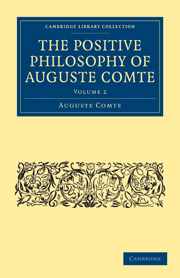Book contents
- Frontmatter
- Contents
- CHAPTER I NECESSITY AND OPPORTUNENESS OF THIS NEW SCIENCE
- CHAPTER II PRINCIPAL PHILOSOPHICAL ATTEMPTS TO CONSTITUTE A SOCIAL SCIENCE
- CHAPTER III CHARACTERISTICS OF THE POSITIVE METHOD IN ITS APPLICATION TO SOCIAL PHENOMENA
- CHAPTER IV RELATION OF SOCIOLOGY TO THE OTHER DEPARTMENTS OF POSITIVE PHILOSOPHY
- CHAPTER V SOCIAL STATICS, OR THEORY OF THE SPONTANEOUS ORDER OF HUMAN SOCIETY
- CHAPTER VI SOCIAL DYNAMICS; OR THEORY OF THE NATURAL PROGRESS OF HUMAN SOCIETY
- CHAPTER VII PREPARATION OF THE HISTORICAL QUESTION.—FIRST THEOLOGICAL PHASE: FETICHISM.—BEGINNING OF THE THEOLOGICAL AND MILITARY SYSTEM
- CHAPTER VIII SECOND PHASE: POLYTHEISM.—DEVELOPMENT OF THE THEOLOGICAL AND MILITARY SYSTEM
- CHAPTER IX AGE OF MONOTHEISM.—MODIFICATION OF THE THEOLOGICAL AND MILITARY SYSTEM
- CHAPTER X METAPHYSICAL STATE, AND CRITICAL PERIOD OF MODERN SOCIETY
- CHAPTER XI RISE OF THE ELEMENTS OF THE POSITIVE STATE.—PREPARATION FOR SOCIAL REORGANIZATION
- CHAPTER XII REVIEW OF THE REVOLUTIONARY CRISIS.—ASCERTAINMENT OF THE FINAL TENDENCY OF MODERN SOCIETY
- CHAPTER XIII FINAL ESTIMATE OF THE POSITIVE METHOD
- CHAPTER XIV ESTIMATE OF THE RESULTS OF POSITIVE DOCTRINE IN ITS PREPARATORY STAGE
- CHAPTER XV ESTIMATE OF THE FINAL ACTION OF THE POSITIVE PHILOSOPHY
CHAPTER XIV - ESTIMATE OF THE RESULTS OF POSITIVE DOCTRINE IN ITS PREPARATORY STAGE
Published online by Cambridge University Press: 29 August 2010
- Frontmatter
- Contents
- CHAPTER I NECESSITY AND OPPORTUNENESS OF THIS NEW SCIENCE
- CHAPTER II PRINCIPAL PHILOSOPHICAL ATTEMPTS TO CONSTITUTE A SOCIAL SCIENCE
- CHAPTER III CHARACTERISTICS OF THE POSITIVE METHOD IN ITS APPLICATION TO SOCIAL PHENOMENA
- CHAPTER IV RELATION OF SOCIOLOGY TO THE OTHER DEPARTMENTS OF POSITIVE PHILOSOPHY
- CHAPTER V SOCIAL STATICS, OR THEORY OF THE SPONTANEOUS ORDER OF HUMAN SOCIETY
- CHAPTER VI SOCIAL DYNAMICS; OR THEORY OF THE NATURAL PROGRESS OF HUMAN SOCIETY
- CHAPTER VII PREPARATION OF THE HISTORICAL QUESTION.—FIRST THEOLOGICAL PHASE: FETICHISM.—BEGINNING OF THE THEOLOGICAL AND MILITARY SYSTEM
- CHAPTER VIII SECOND PHASE: POLYTHEISM.—DEVELOPMENT OF THE THEOLOGICAL AND MILITARY SYSTEM
- CHAPTER IX AGE OF MONOTHEISM.—MODIFICATION OF THE THEOLOGICAL AND MILITARY SYSTEM
- CHAPTER X METAPHYSICAL STATE, AND CRITICAL PERIOD OF MODERN SOCIETY
- CHAPTER XI RISE OF THE ELEMENTS OF THE POSITIVE STATE.—PREPARATION FOR SOCIAL REORGANIZATION
- CHAPTER XII REVIEW OF THE REVOLUTIONARY CRISIS.—ASCERTAINMENT OF THE FINAL TENDENCY OF MODERN SOCIETY
- CHAPTER XIII FINAL ESTIMATE OF THE POSITIVE METHOD
- CHAPTER XIV ESTIMATE OF THE RESULTS OF POSITIVE DOCTRINE IN ITS PREPARATORY STAGE
- CHAPTER XV ESTIMATE OF THE FINAL ACTION OF THE POSITIVE PHILOSOPHY
Summary
As I have intimated, our scientific conclusions cannot be so important or so extensive as our logical conclusions, because they relate to a system of knowledge scarcely yet instituted: yet it is necessary to follow up the logical summary with a sketch of the proper nature and connection of the abstract studies that we have examined in succession; our present view regarding them as so many necessary elements of a single body of doctrine, according to our principle.
We have perceived throughout that, in the case of the human evolution at least, there exists a natural agreement between our knowledge and our needs. The knowledge which, is inaccessible to us is precisely that which could answer no purpose but gratifying a vain curiosity. We have no concern with anything but the laws of phenomena which affect human beings; such action, however indirect, constituting a basis of positive estimate, the full realization of which can follow only very remotely the manifestation of the corresponding needs, at any rate till we can institute a better research. This scheme must comprehend, on the one hand, Humanity itself, in its existence and action; and, on the other hand, the general medium, whose permanent influence is an essential element in the whole movement. Every scientific, as well as logical consideration, shows the necessity of the study of the medium; and thus naturally divides science into the two departments,—inorganic and organic science; the first being the indispensable preparation for the second; and the second simply modifying the phenomena of the first by a nobler action.
- Type
- Chapter
- Information
- The Positive Philosophy of Auguste Comte , pp. 535 - 548Publisher: Cambridge University PressPrint publication year: 2009First published in: 1853



